Small Business News
Find out what’s happening right now.
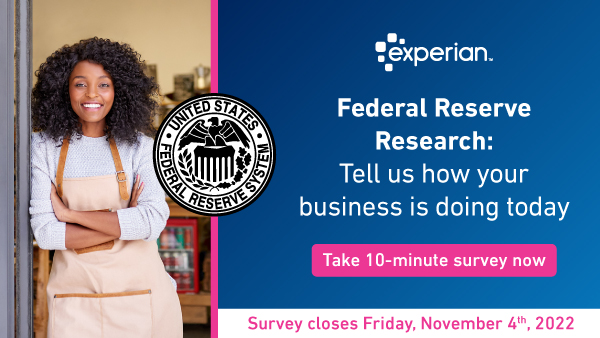
The Fed has begun collecting responses to the Small Business Credit Survey, we encourage small businesses with less than 500 employees to participate.
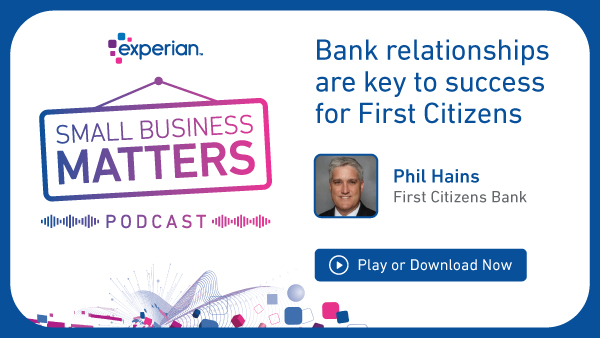
Experian is delighted to interview Phil Hains from First Citizens Bank for the Small Business Matters podcast this week to talk about small business finance.
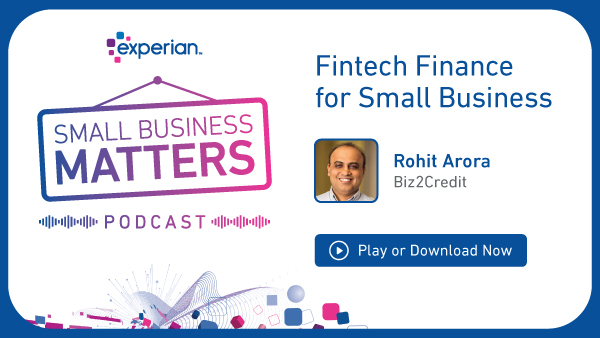
Rohit Arora is one of the country's leading experts in small business finance. His company, Biz2Credit, uses technology to streamline business funding.
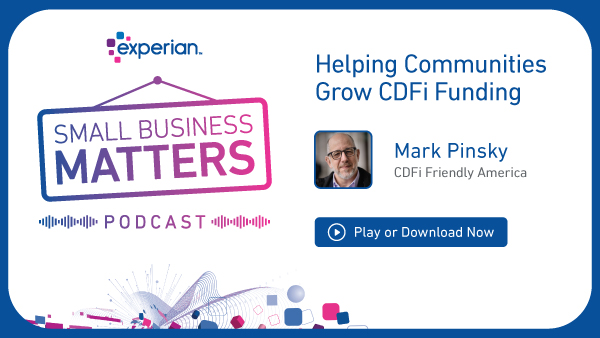
CDFI Friendly America is on a mission to grow the number of CDFI's and make serious inroads into major U.S. cities. We spoke with Mark Pinsky about it.
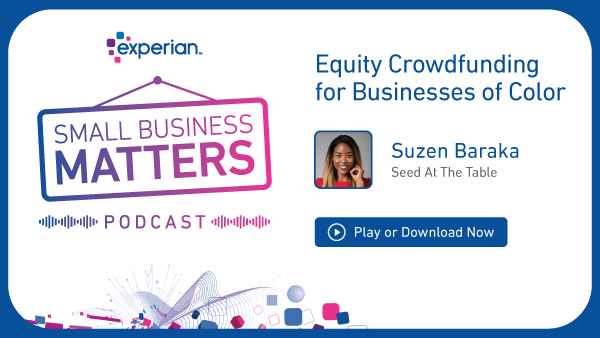
Seed At The Table is a mission-driven, equity crowdfunding platform committed to connecting diverse entrepreneurs with non-accredited investors looking to obtain equity or debt exposure at modest investment amounts. Emily Garman spoke with Suzen Baraka, Seed's Chief Administrative Officer to learn how they are working with small businesses.
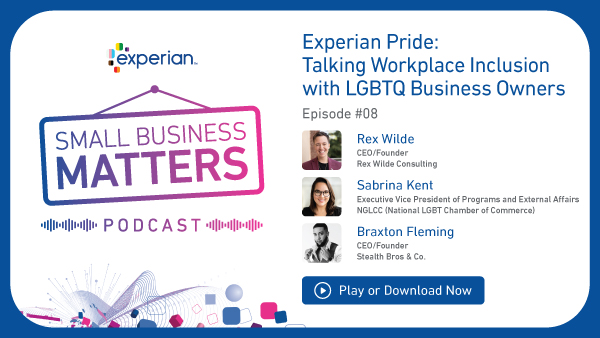
During Pride month, Experian wants to shine a light on Diversity, Equity, and Inclusion by sharing stories told by LGBTQ business owners, policymakers, or anyone who believes actions speak louder than words when it comes to creating jobs, equality and inclusion in the workplace. This week we speak with three guests who share insights and expertise around LGBTQ+ inclusion in the business environment. The video and transcript of our interview are below. [Emily]: Hello, everyone. And welcome to Experian's Small Business Matters podcast. I'm Emily Garman with Experian Business Information Services. My pronouns are she and hers. It's Pride month, and I'm so excited to have three very special guests with me today. You know, Experian is a big company, and we believe we have a responsibility to set the bar for diversity, equity, inclusion, and belonging in the workplace. And one of the ways we do that is by giving our listeners on this podcast the chance to walk in somebody else's shoes for a while. So in today's episode, you're going to meet two LGBTQ business owners who are working hard and achieving success by showing up every day and making connections with their clients and customers. You'll also hear from an organization that exists to create and serve those connections in the business community. So if you're an LGBTQ business owner, or you're thinking about starting a business, we think you are amazing and brave! And our goal is to inspire you and give you some real world information you can use today in your journey. And if you're not an LGBTQ business owner, we think you'll still be inspired, and we'll also be dropping some action items that you can take today to make sure that your business is inclusive and welcoming to employees, customers, and clients of all genders. So let's get to it. Really quick, let me introduce our guests. First, we have Braxton Fleming, founder of Stealth Bros & Co, a company that makes custom medical supplies that are stealthy discreet, and very, very cool. Braxton is also a nurse who served during the COVID pandemic! Braxton, thank you for your service as a nurse. And tell us a little bit about Stealth Bros & Co, how you got started, how things are going, and tell us your pronouns, please. [Braxton]: Absolutely. My pronouns are he and him. And first and foremost, I just want to say thank you for having me on! I'm grateful to share space with all of you today. The way that I got started with Stealth Bros & Co was honestly, I obsessed over YouTube videos when I first started to transition, because I felt so connected to a community that I really didn't have prior knowledge to before my transition. So, as I was watching these videos, I was indirectly assessing people and realizing that there was nowhere safe for them to place their syringes and medications. And I, as I too, was taking the medications, I needed somewhere safe, neat, and discreet to hold all of my medical needs. So that's really what helped push the idea of creating Stealth Bros. I wanted to build something that helped me build community, because I felt so connected to the brotherhood of, you know, females to males [FTM] that I needed. I felt like I needed to come in and do something. And also I wanted to raise money for my top surgery. So I figured what better way than to raise it within my community. And I can also give back to them by creating my own lane so that I could also work with other LGBTQ business owners that I looked up to at the time. So that's really how I got started and where we're at now is just, we're on another level now, which is, you know, major thanks to NGLCC because if it wasn't for joining NGLCC, I don't think that I would be in the position that I am today with my business, just from the networking and the opportunities that have been placed up for me. Stealth Bros is going to be a household name soon. And if it wasn't for NGLCC, I wouldn't have had that opportunity. So that's where we're going. That's what's going on right now. And I'm just super pumped to be here. So thank you. [Emily]: That's great. Thank you so much, Braxton. We're also happy to have Rex Wilde of Rex Wilde Consulting here today. Rex provides transgender inclusion training and consults with companies all over the world on how they can become more inclusive specifically of their transgender and nonbinary employees and customers. So Rex, tell us about what you do and please let us know your pronouns. [Rex]: Absolutely. Thank you so much, Emily, for having me. I'm so excited to be here with everyone today. My name is Rex Wilde. I use they and them pronouns, and I'm the founder and CEO of Rex Wilde Consulting, where I work directly with businesses and corporations, both nationally and internationally on TGX, or trans and gender expansive inclusion in the workplace. And so that happens through a couple of ways, whether through training and getting education to employees on trans, non-binary, and gender expansive individuals, and also how to take direct action to be supportive of trans folks in their workplaces, their coworkers, colleagues, and the communities that they serve as well. I work on policy consulting, so helping to create new policies around bathrooms, pronouns, etc., not only helping to create those policies, but also seeing the rollout so that folks, no matter at their level of understanding, are able to understand what the policies are and implement them appropriately and effectively to create more inclusive workplace environments for folks who are trans non-binary and gender expansive. [Emily]: That's fantastic. Rex, I'm so glad you're here. And then of course, the person who brought us all together, Sabrina Kent is Executive Vice President of Programs and External Affairs for the NGLCC, which is the national LGBT Chamber of Commerce. She is going to share some resources for all businesses, so everyone listening is going to find something really valuable in what she has to say. Welcome Sabrina. Tell us about the NGLCC and what are your pronouns? [Sabrina]: Thanks so much, Emily. I'm so excited to be here with you all I'm Sabrina Kent. I use she, her pronouns. I am our EVP of programs and external affairs at the National LGBT Chamber of Commerce, affectionately known as NGLCC. NGLCC was founded in 2002. It's actually our 20th anniversary year right now, which is very exciting. You know, we were founded in the Bush administration. It was a very different time for LGBTQ folks. And I don't say that to say that everything is perfect now because it's not; if it were, organizations like mine wouldn't exist. But the core work of what we do is to support LGBTQ business owners, to economically empower the LGBTQ business community. There are an estimated 1.4 million LGBTQ business owners in the US who contribute an estimated $1.7 trillion annually to the U S economy. That's trillion with a T! And our voices deserve to be heard, and our businesses deserve to be included in procurement opportunities. So that's exactly what we do: we partner with companies like Experian. At this moment we have over 400 corporate partners in the Fortune 1000 who are working with NGLCC to include LGBTQ businesses in their supply chain. We also advocate on the local and state level and also federal level again, to include LGBTQ businesses in public sector opportunities. There are 53 affiliate chambers across the US, nearly 30 more globally in over 30 countries now, which is very exciting. So pretty much wherever you are in the world at this point, there's likely an LGBTQ chamber of commerce nearby. [Emily]: Wow, fantastic. Thank you Sabrina. So now that we've met everybody here, I want to get into the questions and we'll kind of take it person by person here. So my first question, I'd like to start with Sabrina, and then if, if Rex or Braxton, if you all want to kind of weigh on this too. You know, there are many challenges to being LGBTQ and unique challenges to being trans and nonbinary. And those challenges have huge impact on the trans community and on trans individuals. And we talk a lot about those challenges, and those challenges are accurate and they certainly deserve attention. However, I think we also need narratives of trans success and trans normalcy, and that's one of the reasons I wanted to bring you all here today. But I think some people might say, well, all people face challenges when they're starting businesses are growing their business. So why is it important that we spotlight LGBTQ business owners, and particularly trans business owners now, I mean, it's pride month, but why do we need to look at these stories more closely? [Sabrina]: Yeah, I think that's a really great, great question. You know, first and foremost, I think for any business owner, the first thing that you're probably thinking about is access to capital. And so let's focus in on the LGBTQ community right now, because you can get married in 50 states as an LGBTQ person right now. And in over half of the states in this country, you can legally be denied access to credit and financing because you are LGBTQ. So there are unquestionable barriers to entry for the LGBTQ community. And when our identities intersect, whether it be with race, gender, gender expression, and so forth, those challenges only become more difficult. And I'm glad today's conversation is going to be about trans joy and LGBTQ joy and success. But there are very real challenges that LGBTQ business owners face. If I am a trans entrepreneur in New York city and I'm discriminated against in lending, my options for recourse are going to look very different than how they may look for a trans woman entrepreneur in Arkansas, for example. [Sabrina]: And so it's really this patchwork of opportunities, or am I going to lose my contract if the company that I'm working with finds out that I'm an LGBTQ business owner? I can't think of a single instance in which a heterosexual cisgender business owner has lost a contract because of their sexual orientation or gender identity and expression. And so for us, our work is to ensure that our business owners can enter all facets of life anywhere in the country and ensure that they aren't going to lose opportunity simply because of who they are or who they love. [Emily]: Any of the two of you Braxton, or Rex? You'd like to weigh in on that a little bit? [Rex]: Yeah, absolutely. I mean, taking, you know, a different approach. And I think everything that Sabrina said is just so apt and important for us to understand, you know, one of the things that I've had to navigate in my experience as a trans and non-binary business owner has been, when I first thought about the idea of starting my own business, the first thing I started doing was listening to podcasts and stories and reading books about other entrepreneurs who started their journey. And what did it look like for them? What did it look like for them from the moment they had an inkling that they might want to start something, and then actually being able to put that into action and seeing their vision come true. And with that, you know, we don't have a lot of representation around trans and non-binary folks and LGBTQ folks at large, who are successful business owners first and foremost, do they exist? Absolutely they do. Without a doubt, you know, me and Braxton are right here. And the network of folks who are LGBTQ business owners within the NGLCC is just such a huge, incredible network. However, those are not the stories that are immediately available when we're looking for stories of successful entrepreneurs. And so one of the reasons I think that having visibility is so important, is so that folks who have shared identities know that their identity does not need to be a barrier to being able to start a business and to being a successful entrepreneur and business owner. For me, having stories of trans success, having stories of LGBTQ business success has been such an important thing for me to recognize and realize, you know, that there are possibility models that really show me what's possible for me. By me being open about my own entrepreneurial journey as a non-binary person, that I am also able to show folks who are just starting out their entrepreneurial journey or for trans and non-binary youth, for example, what the possibilities of their future can look like. And that those possibilities are endless. [Emily]: So Braxton, when you were starting out your business, when you had that inkling and idea, what did you find most helpful? I mean, what would you tell to somebody in your shoes, you know, whenever you started out? Was it advice, resources, books? What would you say to somebody who's just starting out? [Braxton]: The books definitely helped me in the podcast and YouTube. I definitely just dove into self care and I really focused on what I wanted. And for me, my business is more like my life's path, my passion. So I didn't put the pressure of, 'I need to build this business to create wealth.' I was really creating this business because it was a part of me. It was a passion of mine and I wanted to build community. So I didn't put the pressure on it. And I feel like when you're starting a business, you can't put the pressure of, you know, creating wealth. Of course, we all want to create wealth, but at the end of the day it is the passion and the self-awareness of who you are and where you want to take your life, that's what's going to help you move forward and really make an impact with your business. [Emily]: And I know when you and I were talking earlier, something you mentioned too, was that you, you filled a void, there was not a product that existed in the marketplace that filled the need that you had. And so you thought, well, I can take this somewhere. [Braxton]: Yes, absolutely. Absolutely. And I feel like I realized that, you know, as I was creating the business, I knew that we needed it. I just didn't realize how many other communities needed it as well. And when I reached the end of that first year and I realized, 'Hey, I put so much money into my support fund and not into the Brax fund.' You know, I gave away all that money to someone else. I said, you know what? This is really impacting people. This is really moving in a way where people are telling me, it's making them feel, it made them feel better, you know, it's helped them. It's given them a reason to make sure they're taking it on time and things of that nature. So it's an amazing experience to be a part of it. [Emily]: Yeah. I noticed when we're talking about thinking about resources that are available to people who are interested in starting a business, a place that you would kind of typically turn might be a local chamber of commerce. And so you both have mentioned the NGLCC. Sabrina can you give us some more information about what the NGLCC can offer to LGBTQ business owners and what are the benefits of being part of that community? [Sabrina]: Absolutely. Yeah. I think first and foremost, we provide our primary product, if you will, which is LGBT business enterprise certification. This is modeled off of the certification for women and minority-owned businesses. The disability and veteran chambers have modeled their certification off of ours. This is sort of the gold standard for corporations to confirm that yes, the business is in fact diverse owned. They can count them and include them as such in their supply chain, but that's just step one. Certification is just getting your foot in the door. In order to get certified with us, you need to be a member of your local chamber of commerce, and that waives the certification fee with NGLCC. That allows you to really get in on the ground in your local community, start networking and building those connections, and then come to us nationally to be connected with larger national corporate opportunities or even international corporate opportunities, but also have access to work with fellow LGBTQ business owners. Outside of that, education, resource sharing, mentorship--these are huge for us. I always say Braxton is like my model of the certified business that has taken advantage of absolutely everything that we have to offer. Rex did the exact same thing. They got certified at the start of the pandemic and just wanted to dive right in. They took part in our TGX initiative, our trans and gender expansive initiative at NGLCC. And these two are great examples of people that are putting their certification to work for them because they're showing up to educational programs, they're responding to RFPs, they're learning how to write capabilities statements, they're really being present. And your certification will only work for you as much as you're willing to work for your certification. So there's a world of opportunity that certification opens, but it's not your golden ticket to the contract. It's what you do with it that will push you over that line of success. Sort of like what Braxton was talking about at the beginning. [Emily]: That's so true. It is so much about what you put into it yourself. But the community certainly helps too, and I want to just clarify one point for our listeners. So you mentioned local chambers. So most cities and towns have a chamber of commerce, but do you have branches in cities and towns across the country? Or are there partner affiliate organizations? [Sabrina]: Yeah, so all of our affiliate organizations, with the exception of NGLCC New York, are wholly owned, independent organizations who are affiliated through the NGLCC network. And that means that these affiliates are meeting a gold standard for what it means to serve their local LGBTQ businesses. So each affiliate is a little bit different in their own right, But at the end of the day, we're all there with the ultimate goal of serving our stakeholders. And then we are able to share resources back with our affiliates to help them grow and scale and continue to serve their local communities in a better way. [Emily]: I want to shift a little bit here and kind of go back to Rex with their expertise about this, because this is something important for the many, many business owners who listen to this podcast. They work in large companies and small. And so Rex, I think that many businesses of all sizes and industries are realizing that when employees feel accepted and comfortable and welcome at work, that everyone wins. You know, at Experian we have a motto in our HR--this is what actually encouraged me to apply Experian--and it is "bring your whole self to work." So what are some important things that somebody can do, whether they're a small business owner of a single retail shop in a town, or they're an HR director for a global company, what can they do to make employees of all genders and all identities feel like they can bring their whole selves to work? [Rex]: That's such a great question. And I think we could spend hours talking about all of the different ways that that could look! But I think one place to start is really having an intention behind what you are actually culturally going after. And so like this idea with Experian, right, where you are setting up a culture to be able to bring your whole self to work. Now, on a pragmatic level, what that might look like, for example, if you are a brand that is starting out, and you want to make sure you're encompassing of all genders across the spectrum? What that might look like is making sure that the language that you use around your messaging to your customers, to your employees, whomever it may be, is really conscientious of the fact that there are folks that exist across the gender spectrum--men and women and genders in between and beyond that as well. [Rex]: And so culturally, when we're working within companies, the reality is that a lot of people haven't had direct exposure to individuals who are trans, non-binary, or gender expansive. And because of that, they might not always know what the cultural norms are, or what's appropriate in terms of things like language pronouns, or how to ask the right questions. Or if questions that they're asking about folks who are gender diverse are appropriate or being asked in an appropriate way. And so for me, that really comes from a standpoint of needing to have education and cultural understanding of some of the norms and best practices around folks who are transgender, expansive, et cetera. So if I'm talking to someone who's, you know, the director of HR at their organization, they really are the stakeholder for being able to help with employee education in that realm. And making sure that employees are able to engage in thoughtful, authentic, and educational conversations around how to be more welcoming to someone who is a trans or gender expansive person. And part of that is just understanding that you might not know a perspective of someone who holds a different identity than you. You know, I remember one of the things that we were talking about before, Emily, was this idea that non-binary folks often have really different experiences from folks who identify as binary. Or folks who are binary trans people as well, who will have experiences where if you go into a public space, for example, and there's only a men's room and a women's room. There's not an all-gender facility available; from my perspective, as someone who is non-binary, what does that mean for me? That means that I have to think to myself, you know, what is the safest space for me to go into right now, when I'm offered only sex-segregated facilities? It means that I have to assume, okay, what gender am I most likely to be perceived as right now? And then make a choice that doesn't align with my identity, but feels like the safest option for me in the physical sense. So, understanding that those are lived realities and lived perspectives that exist with folks who are a part of the greater TGX community is so important. And understanding how you might need to set up systems, or how you might need to set up education, or how you might need to have a perspective shift to understand the cultural differences that exist for folks across the TGX spectrum. [Emily]: You really hit on there what I've been trying to articulate. What I've been thinking about this and preparing this is--that is why it's so important to get as much of these things as right as we can. In terms of making an environment for our employees and our coworkers and our clients and customers. And it's why using people's pronouns correctly is important. It is, it is why having gender neutral bathrooms matters. It's why dress codes and appearance guidelines are a big deal. Because the more time that somebody has to spend masking their true self, or trying to fit in in this way, or maybe they're afraid to talk about their family, or mention what they did this weekend, because it involved a same sex partner or something like that, the more they have to hide and mask their true self--and that is energy depleting. And the more you have to do that, the less you're able to focus on your work, and doing your job, and just being a person in the world. And that's something that people who are straight cis-gender, they fit in the binary. They just don't think about that. And I think you've given us a lot to think about where we can really be in somebody else's shoes for a while, so that emotional labor really adds up and can take a toll on a person too. I'm sorry to say we are out of time. Sabrina, Rex, Braxton: I just want to extend my deep gratitude to each of you for being here today and taking the time to prepare and do this with me. Your journeys, and the things that you've shared are really inspiring. Your practical advice and wisdom can give us all just a lot to think about, and, more importantly, not just think about, but do. We can take some action to make things better for the people we care about that are in our work communities. Thanks to everybody who's joined us, and those who are listening to the recording. We will have contact information for all of our guests down in the body of this post. Check there in case you need a very fly dopp kit, some sage guidance and wisdom for your business, or you're interested in being part of or supporting the national LGBT chamber of commerce. So thanks again for joining us, and happy Pride month! Especially to our GLBTQ business owners, from Experian Business Information Services!
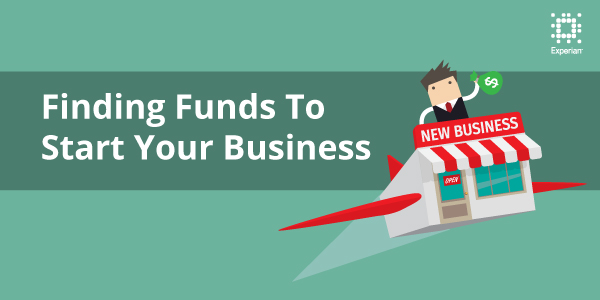
In celebration of National Small Business Week, today’s Guest Post comes from small business influencer Barbara Weltman, who shares insights on how to get money to start a business. Barbara Weltman (@BarbaraWeltman) is an attorney, a prolific author with such titles as J.K. Lasser’s Small Business Taxes and J.K. Lasser’s Guide to Self-Employment, and a trusted advocate for small businesses and entrepreneurs. She is also the publisher of Idea of the Day® and Big Ideas for Small Business® at www.barbaraweltman.com as well as host of a monthly radio show. She’s been named one of the 100 Small Business Influencers five years in a row. It takes money to start a business and get your idea off the ground. Depending on the nature of your business, you may require only a little bit of cash—your seed money—or you may need considerable funds. You can borrow money (debt) or find investors (equity) to meet your capital requirements. Here are some funding options to explore. Self-funding According to the National Venture Capital Association (NVCA), 82 percent of all businesses start with the owner’s personal resources. These can come in a variety of ways: Personal savings. This is the best source of capital because there are no strings attached—no repayments, no interest cost, no timing issues. Credit card borrowing. Using personal credit cards to start a business is pretty common. Sergy Brin and Larry Page did this to start Google in the 1990’s. The biggest downside: the high interest rate. Home equity borrowing. If you own a home that’s worth more than your mortgage, you can borrow with a home equity loan (the lender sets the borrowing limits). The downside: If the business fails and you can’t repay the loan, you could lose your home. Caution: Don’t dip into your 401(k) and IRAs to start businesses. Doing this not only costs you in taxes up front, but if the business fails, you lose your retirement savings. Check out our interview with Christina Edel on taking on business debt >> Loans and lines of credit Don’t expect to walk into your neighborhood bank to get a loan for starting your business. Even SBA loans, which are commercial loans guaranteed by the U.S. Small Business Administration, usually aren’t available for startups. If you have an excellent credit score—680 or better—you may qualify for a personal loan, but interest on such borrowing is high, even in today’s low interest environment. With a good credit score, your business may qualify for a line of credit; your personal guarantee can swing this financing. You only pay interest on the portion of the line you draw upon. For example, if you have a $50,000 line of credit and use $20,000, you pay interest on $20,000. NVCA reports that 41 percent of startup funding comes from loans and lines of credit. Family and friends A rich uncle or a fabulous friend may help you get started by either investing in your business or giving you a loan, as about a quarter of all business startups do. But ask yourself whether your relationships will sour if the business doesn’t succeed and your investor or lender loses money. Crowdfunding This relatively new way to find capital for a business can be done in a variety of ways: mere contributions (with no repayment by you), loans as discussed earlier, or, most recently, equity crowdfunding. All together this source of funding from strangers online accounts for about 3 percent of startup funds, according to the NVCA. Conclusion These are just the most common ways to find the cash to get started. You don’t have to choose just one resource; you can combine your options to raise the amount of money required. For example, you may have your friend invest some money and use your personal credit card to buy equipment or other items needed to open your doors for business. Just make sure you know what you’re getting into so you can succeed.
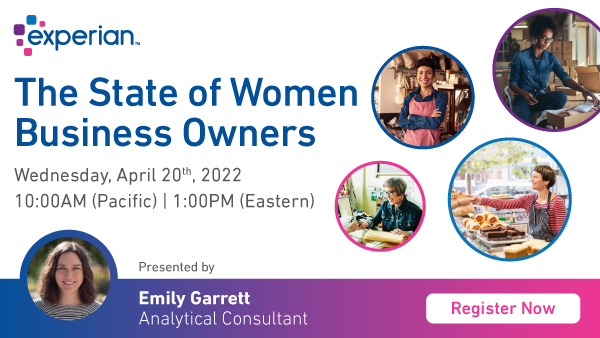
Women-owned small businesses make up roughly 34 percent of new business starts. They are among the businesses most heavily impacted by the pandemic, and minority-owned women-led small businesses were the fastest-growing segment coming out of COVID. Despite solid growth, Women business owners face significant barriers to success. We studied a large dataset of women-owned small businesses to understand their unique needs and challenges. The result is a fascinating look at a powerful small business segment. In this talk you will learn: · Credit behaviors · Top industry sectors · Areas of opportunity for lenders Register for Webinar
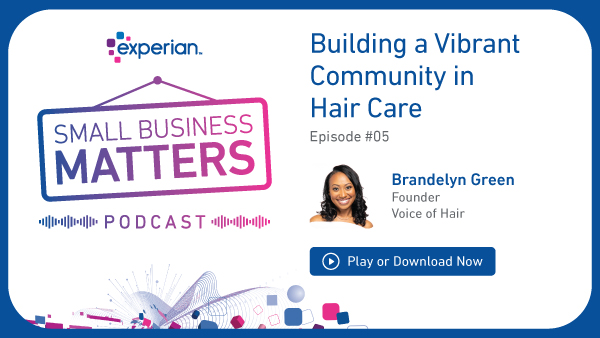
Brandelyn Green, the entrepreneur behind Voice of Hair, knows a thing or two about building a community. Her thriving hair care business is exploding.
